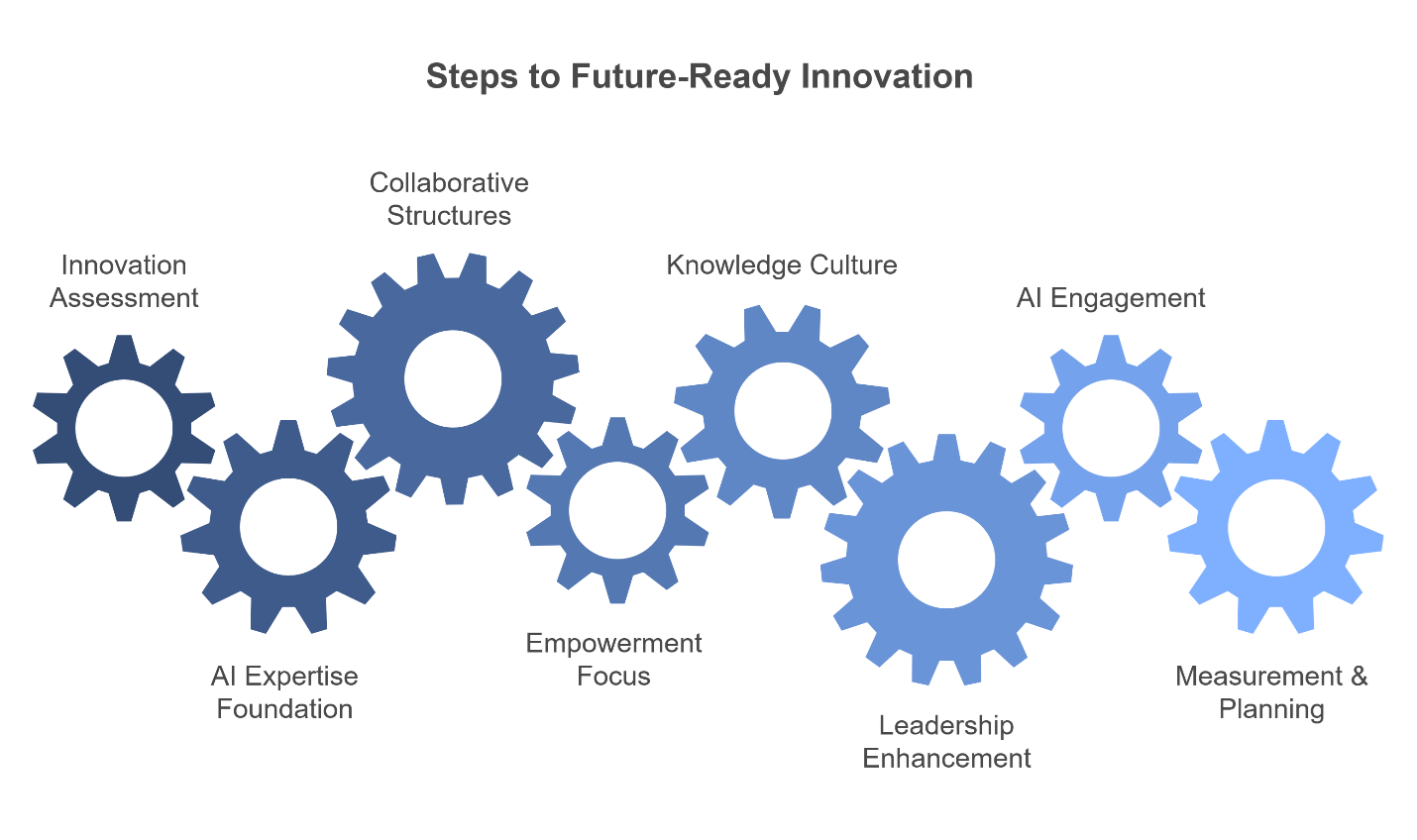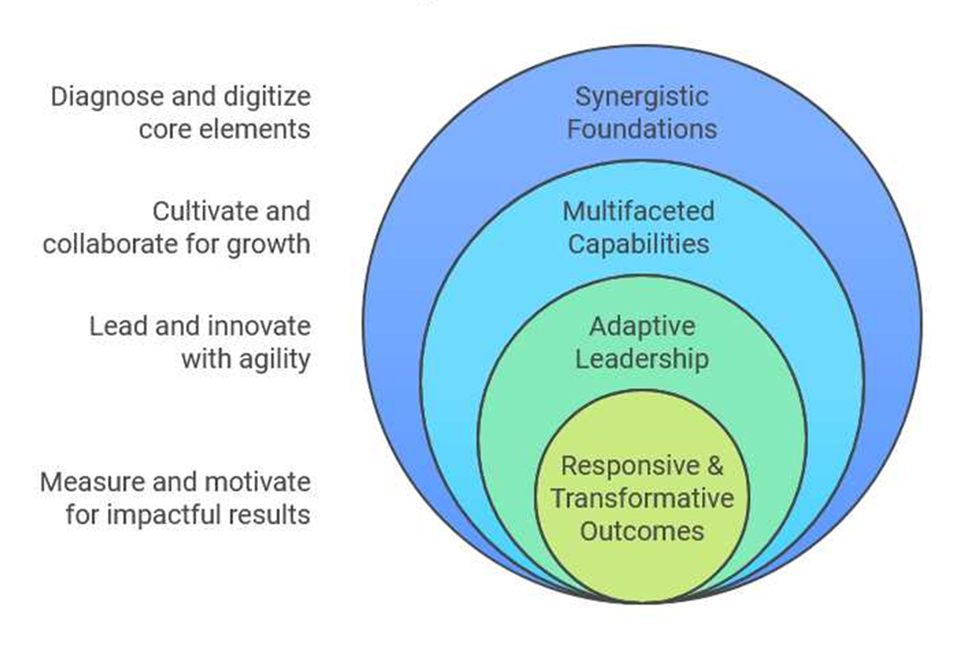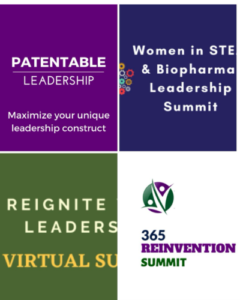AI-Talent Fusion
Insert (CLP) Photograph on Web Page (Align Right)
The Appleton Greene Corporate Training Program (CTP) for AI-Talent Fusion is provided by Dr. Adeleye PhD Certified Learning Provider (CLP). Program Specifications: Monthly cost USD$2,500.00; Monthly Workshops 6 hours; Monthly Support 4 hours; Program Duration 24 months; Program orders subject to ongoing availability.
Personal Profile
Tolu Adeleye, PhD, a distinguished talent development and innovative leadership consultant, is on a mission to guide organizations to unlock the full potential of their talent investments. With a profound background in academia and R&D within the biotechnology and pharmaceutical industries, she earned her PhD in Immunology from the National Institute of Medical Research, London, UK. She holds professional certifications in leadership and executive coaching and various aspects of talent management.
The early background of her career provided various aspects of Dr. Adeleye’ s gradual progression into themes of reinvention and innovation thereafter advancement in the professional training field.
In her first role as a professor in academia, she worked alongside other university professor colleagues to upskill pharmacists who were trained in various global locations countries to become equipped to practice the profession of pharmacy in her home country. Thus, she carried out her first innovation driven by talent training – enabling skilled professionals to innovate and adapt their previously acquired skills towards productivity in a new location and work environment.
Subsequently in her role as a R& D biomedical scientist in a biotechnology company, Dr. Adeleye became accustomed to the lack of leadership and soft skills proficiency amongst highly skilled technical and scientific employees. This gap in proficiency served as a stimulus for her in the creation and delivery of leadership trainings and executive coaching services when she changed careers into professional training and coaching.
In this phase, the concept of innovation driven by talent took on a new meaning for Dr. Adeleye. As an advocate of continuous learning, she provided leadership trainings and hosted leadership enabling events for professionals in various industries especially those in the STEM fields. This upskilling process towards acquiring collaborative leadership acumen served as innovation driven by talent for these next generation leaders, enabling them to acquire newer set of skills to take on innovative leadership roles in their organizations.
innovation driven by talent remained a priority theme in Dr. Adeleye’s services when she later shifted her focus more to talent development, with the core focus of enabling organizations to maximize their ROI on talent investments.
In her over 15 years of experience in the professional training field, Dr. Adeleye has evolved into a Talent Value Maximizer, specializing in areas such as Talent Development, Learning and Development, and Business Strategy.
She is a certified recertification provider for the Society for Human Resources Management (SHRM), emphasizing her commitment to upholding the highest standards in the industry.
As the CEO of a leadership and talent development consulting firm, in addition to talent strategy advisory, she provides corporate trainings on different aspects of talent management such as internal talent mobility, navigating careers and innovation driven by talent. She champions cross-skills training within organizations, enabling the optimization of talent values and proactive succession planning.
With a unique blend of scientific expertise and coaching prowess, she is positioned to guide organizations through purpose-driven growth plans in today’s global and digitized workforce environment.
Dr. Adeleye ’s work and thought leadership continue to inspire HR leaders and talent managers to build agile, adaptable, and growth-oriented teams that thrive in today’s rapidly changing business environments.
In the rapidly evolving hybrid and AI-enabled workplace environment, the role of enhancing innovation- equipping talent to embrace innovative mindsets and become the drivers of innovation within organizations- will be an increasing necessity.
Innovation driven by talent will continue to be a well sought after area of corporate training and employee development because as the technological advancements of AI and automation continue to evolve, so will the need for continuous upskilling and reskilling intensify. Organizations will require innovative talent strategies to harness these technologies effectively. Using an AI-TALENT FUSION concept presents l opportunities for driving such in our future work environment.
In addition, global business themes such as the expansion of global markets, the permanence of remote work, increasingly diverse workforce demographics and more focus on sustainability will all continue to make it necessary for organizations to innovate thus driving the need for innovation capabilities in employees.
In awareness of all these factors, Dr Adeleye is well vested in the area of enabling talent to continue to be champions of innovation in their organizations. In addition to providing corporate trainings on innovation enhanced by AI-TALENT FUSION, she aims to continue to use various avenues to pursue this mission. Through signature talks, industry partnerships, talent ecosystem collaborations and other future-ready workforce initiatives, equipping talent for innovation will be a strategic compass guiding Dr. Adeleye’s influential leadership.
To request further information about Dr. Adeleye through Appleton Greene, please Click Here.
(CLP) Programs
Appleton Greene corporate training programs are all process-driven. They are used as vehicles to implement tangible business processes within clients’ organizations, together with training, support and facilitation during the use of these processes. Corporate training programs are therefore implemented over a sustainable period of time, that is to say, between 1 year (incorporating 12 monthly workshops), and 4 years (incorporating 48 monthly workshops). Your program information guide will specify how long each program takes to complete. Each monthly workshop takes 6 hours to implement and can be undertaken either on the client’s premises, an Appleton Greene serviced office, or online via the internet. This enables clients to implement each part of their business process, before moving onto the next stage of the program and enables employees to plan their study time around their current work commitments. The result is far greater program benefit, over a more sustainable period of time and a significantly improved return on investment.
Appleton Greene uses standard and bespoke corporate training programs as vessels to transfer business process improvement knowledge into the heart of our clients’ organizations. Each individual program focuses upon the implementation of a specific business process, which enables clients to easily quantify their return on investment. There are hundreds of established Appleton Greene corporate training products now available to clients within customer services, e-business, finance, globalization, human resources, information technology, legal, management, marketing and production. It does not matter whether a client’s employees are located within one office, or an unlimited number of international offices, we can still bring them together to learn and implement specific business processes collectively. Our approach to global localization enables us to provide clients with a truly international service with that all important personal touch. Appleton Greene corporate training programs can be provided virtually or locally and they are all unique in that they individually focus upon a specific business function. All (CLP) programs are implemented over a sustainable period of time, usually between 1-4 years, incorporating 12-48 monthly workshops and professional support is consistently provided during this time by qualified learning providers and where appropriate, by Accredited Consultants.
Executive summary
AI-Talent Fusion
The concept of innovation driven by talent- the enabling of employees for productivity and innovation towards achieving an organization’s business goals towards maintaining competitiveness – has evolved over the past few decades. On the global level, innovation driven by talent has shifted from a narrow focus on individual high performers to a comprehensive approach that integrates technology, emphasizes diversity, and fosters a culture of continuous learning and adaptation. This evolution reflects the changing nature of work and the increasing importance of human capital in driving organizational success and innovation.
Currently, in this rapidly evolving hybrid and AI-enabled workplace environment, the role of innovation driven by talent- equipping talent to be champions of innovation will be needed even more.
Currently and in the future, as the technological advancements of AI and automation continue to evolve, so will the need for continuous upskilling and reskilling will intensify. Organizations will require innovative talent strategies to harness these technologies effectively. Thus, the topic of innovation driven by talent will continue to be a well sought after area of corporate training and employee development.
Another key factor in our future of work environment is the expansion of global markets and the permanence of remote work. All these will necessitate new approaches to managing and developing talent across diverse geographies.
When the issue of workforce demographics is considered, an increasingly diverse workforce, that includes more digital-native generations, will make it necessary for organizations to innovate in how they attract, retain, and engage talent.
To add more, as businesses focus more on sustainability, there will be a need for innovation driven by talent strategies that align with these values, fostering cultures that prioritize ethical and sustainable practices.
Thus, AI-TALENT FUSION will continue to be of great value in equipping many corporate function leaders – talent management, Human Resources leaders , innovation and business executives- in both medium and large enterprises. The program will equip and enable these leaders towards innovation and productivity that in this rapidly evolving global business environment and beyond into the future.
Here is the full description of the AI-TALENT FUSION PROGRAM
Executive Summary: AI-TALENT FUSION Program
AI-TALENT FUSION program is a groundbreaking, 12-month initiative designed to transform talent management and foster a culture of continuous innovation across diverse industry sectors. This comprehensive, process-driven program is tailored for HR professionals, Learning & Development specialists, Talent Acquisition experts, and Business Unit Managers in medium to large enterprises, as well as fast-growing, scaling startups.
In today’s rapidly evolving business landscape, characterized by technological disruption and global challenges, the ability to innovate is crucial for survival and growth. The AI-TALENT FUSION program addresses this critical need through a structured, cumulative learning journey that equips participants with the tools, strategies, and mindset required to drive ongoing innovation throughout their organizations.
Key Features:
Process-Driven Approach: The program follows a carefully designed, step-by-step process that builds upon itself each month, ensuring a logical progression of skills and knowledge acquisition.
Cumulative Benefits: Each module builds on the previous ones, creating a compounding effect where insights and skills from earlier sessions enhance the learning and application in subsequent modules.
Industry-Specific Customization: Tailored content and case studies relevant to a wide array of sectors, including pharmaceuticals, technology, renewable energy, e-commerce, engineering, biotechnology, healthcare, construction, hospitality, travel and leisure, manufacturing, publishing, finance, education, academia, government, agriculture, consulting, and aerospace.
AI-Driven Methodology: Integration of cutting-edge AI tools and methodologies throughout the modules, ensuring participants are at the forefront of innovation driven by talent.
Cross-Functional Collaboration: Emphasis on breaking down silos and fostering collaboration across departments, a crucial skill in today’s interconnected business environment.
Adaptive Learning Pathways: Personalized learning journeys that recognize the diverse needs of participants from various industries and roles, ensuring relevance and maximum impact for everyone.
Real-World Application: Interactive exercises, case studies, and projects that allow participants to apply their learning to real organizational challenges, driving immediate value.
Future-Ready Focus: Culmination in preparing participants to build and maintain innovation ecosystems that can adapt to future trends and challenges.
Program Structure
:
The 12-month journey is divided into monthly modules, each building upon the previous one to create a comprehensive understanding of innovation driven by talent. The process-driven format ensures that participants:
Begin with a solid foundation in innovation diagnosis and goal setting
Progress through AI integration and collaborative structures
Develop strategic capabilities and innovation enablement skills
Cultivate leadership and engagement techniques for innovation
Conclude with advanced measurement and future-proofing strategies
This structured approach allows for the accumulation of knowledge, skills, and practical experience throughout the program, resulting in a transformative learning experience.

Fig 1. AI-TALENT FUSION Program – Steps to Future-Ready Innovation
Cumulative Benefits
:
As participants progress through the program, they will experience compounding benefits, including:
• Increasing ability to leverage AI in talent management processes
• Growing proficiency in fostering cross-functional collaboration
• Expanding toolkit for developing and retaining top talent
• Enhancing capacity to measure and demonstrate the ROI of innovation initiatives
• Building a robust network of peers across various industries for continued learning
• Developing and refining actionable plans to transform their organizations
By the program’s conclusion, participants will have not only acquired a comprehensive set of innovation skills but will also have implemented and iterated on these skills in their organizations, leading to tangible improvements in innovation capacity and organizational performance.
Expected Outcomes
:
The AI-TALENT FUSION program is a transformative experience that equips participants to lead their organizations into a future where innovation is the key driver of success. By investing in this program, companies across all sectors can expect to see:
• Increased adaptability to market changes and technological disruptions
• Improved talent retention and engagement
• Significant boost in capacity for continuous innovation
• Enhanced cross-functional collaboration and knowledge sharing
• Measurable improvements in innovation-driven business outcomes
• Development of a sustainable, future-ready innovation ecosystem
These outcomes are not just immediate benefits but long-term organizational transformations that position companies to thrive in the dynamic business landscape of the 21st century. The process-driven, cumulative nature of the program ensures that these changes are deeply ingrained and self-reinforcing, creating a lasting impact on organizational culture and performance.
On the overall, the components of this program compares well with similar approaches for talent management and innovation enablement that has been used by multinational corporations as referenced in this case study from Flevy- Innovative Talent Strategy for Automation Solution Provide in Healthcare: https://flevy.com/topic/talent-strategy/case-innovative-talent-strategy-automation-solution-provider-healthcare
In this case study, the organization faced a 20% attrition rate and outdated talent management, requiring a complete strategy overhaul. Post-implementation, employee engagement rose by 15% and talent acquisition efficiency improved by 20%. This highlights the value aligning talent management with business objectives and ongoing investment in talent development.
The above case study that was aimed at solving similar problems in medium and large enterprises is a simulation of the expected outcomes for expected outcomes from AI-TALENT FUSION program.Our unique approach of AI- Driven aspects in all aspects of the program serves as a pivot for outcome delivery in an increasingly AI- enabled workforce.
Curriculum
AI-Talent Fusion – Part 1- Year 1 (Process Planning)
- Part 1 Month 1 INNOVATION DIAGNOSIS
- Part 1 Month 2 AI INTEGRATION
- Part 1 Month 3 COLLABORATIVE INNOVATION
- Part 1 Month 4 CAPACITY DEVELOPMENT
- Part 1 Month 5 INNOVATION ENABLEMENT
- Part 1 Month 6 INNOVATION-DRIVEN MOBILITY
- Part 1 Month 7 KNOWLEDGE ECOSYSTEMS
- Part 1 Month 8 INNOVATION CULTURE
- Part 1 Month 9 INNOVATION LEADERS
- Part 1 Month 10 INNOVATION ENGAGEMENT
- Part 1 Month 11 MEASURING INNOVATION
- Part 1 Month 12 FUTURE-READY INNOVATION
AI-Talent Fusion – Part 2- Year 2 (Process Development)
- Part 2 Month 1 Two Words
- Part 2 Month 2 Two Words
- Part 2 Month 3 Two Words
- Part 2 Month 4 Two Words
- Part 2 Month 5 Two Words
- Part 2 Month 6 Two Words
- Part 2 Month 7 Two Words
- Part 2 Month 8 Two Words
- Part 2 Month 9 Two Words
- Part 2 Month 10 Two Words
- Part 2 Month 11 Two Words
- Part 2 Month 12 Two Words
Program Objectives
The following list represents the Key Program Objectives (KPO) for the Appleton Greene AI-Talent Fusion corporate training program.
AI-Talent Fusion – Part 1- Year 1 (Process Planning)
- Part 1 Month 1 INNOVATION DIAGNOSIS – The primary objective of this module is to establish a solid foundation for understanding innovation in the context of talent management and to assess the current state of innovation within the organization. Participants will learn to apply SMART principles to talent development and gain proficiency in using innovation assessment tools. Through interactive exercises and case studies, they will develop the skills to set aspirational yet achievable innovation goals, laying the groundwork for the entire program.
- Part 1 Month 2 AI INTEGRATION – This module aims to equip participants with the knowledge and skills to leverage AI in talent management processes and to identify and utilize diverse expertise within their organizations. Participants will explore various AI applications in HR, learn strategies for mapping multidimensional expertise, and understand the ethical considerations of AI implementation. Through hands-on exercises with AI tools and simulation games, they will gain practical experience in applying these concepts to real-world scenarios.
- Part 1 Month 3 COLLABORATIVE INNOVATION – The objective of this module is to enable participants to build and manage effective cross-functional teams for driving innovation. Participants will learn principles of cross-functional collaboration, explore AI-assisted team formation techniques, and develop strategies for breaking down organizational silos. Through virtual team challenges and interactive games, they will practice creating and leading diverse teams, fostering an environment conducive to collaborative innovation.
- Part 1 Month 4 CAPACITY DEVELOPMENT – This module focuses on developing participants’ ability to identify, prioritize, and cultivate critical organizational capabilities for future success in an AI-driven era. Participants will learn to conduct AI-enhanced skill gap analyses and design personalized learning pathways. Through capability gap analysis exercises and strategic planning simulations, they will gain hands-on experience in aligning capability development with organizational innovation goals.
- Part 1 Month 5 INNOVATION ENABLEMENT – The key objective of this module is to equip participants with the tools and strategies to foster a culture of innovation and empower employees at all levels to contribute to organizational innovation. Participants will explore AI-powered innovation platforms, learn techniques for democratizing innovation, and understand how to balance structure and freedom in innovation processes. Through designing AI-powered idea management systems and participating in innovation simulations, they will develop practical skills in enabling and managing innovation initiatives.
- Part 1 Month 6 INNOVATION-DRIVEN MOBILITY – This module aims to develop participants’ ability to design flexible, innovation-focused career paths and leverage talent mobility as a catalyst for innovation. Participants will learn to create AI-driven career development recommendations and understand how to use talent mobility to spread innovation capabilities across the organization. Through career mapping exercises and interactive games, they will gain practical experience in aligning individual career aspirations with organizational innovation needs.
- Part 1 Month 7 KNOWLEDGE ECOSYSTEMS – The objective of this module is to enable participants to build and maintain a robust knowledge ecosystem that supports rapid innovation. Participants will learn strategies for fostering a knowledge-sharing culture, explore AI-powered knowledge management systems, and develop frameworks for measuring and incentivizing knowledge transfer. Through knowledge audit exercises and simulation games, they will practice optimizing knowledge flow within an organization to drive innovation.
- Part 1 Month 8 INNOVATION CULTURE – This module focuses on developing participants’ ability to foster a culture of entrepreneurship and innovation within their organizations. Participants will learn the characteristics of innovative organizational cultures, explore intrapreneurship programs, and develop strategies for balancing risk-taking with accountability. Through culture assessment exercises and simulation games, they will gain practical experience in shaping organizational culture to support continuous innovation
- Part 1 Month 9 INNOVATION LEADERS – The key objective of this module is to equip participants with the skills to develop innovation leaders and implement effective mentoring programs for innovators. Participants will learn coaching techniques specifically tailored to fostering innovation and explore best practices in designing mentorship programs. Through role-playing exercises and interactive coaching simulations, they will develop practical skills in nurturing innovative talent and leadership within their organizations.
- Part 1 Month 10 INNOVATION ENGAGEMENT – This module aims to enable participants to leverage AI for enhancing employee engagement in innovation initiatives. Participants will explore AI-driven personalization techniques, learn to design games innovation programs, and develop strategies for measuring and enhancing innovation engagement. Through hands-on exercises with AI engagement tools and participation in gamified innovation challenges, they will gain practical experience in creating engaging innovation experiences for employees.
- Part 1 Month 11 MEASURING INNOVATION – The objective of this module is to develop participants’ ability to measure the impact of innovation initiatives and create comprehensive action plans for ongoing innovation. Participants will learn to establish innovation KPIs, explore AI-assisted impact analysis techniques, and develop frameworks for continuous innovation improvement. Through exercises in creating innovation dashboards and strategic planning simulations, they will gain practical skills in demonstrating and enhancing the ROI of innovation initiatives.
- Part 1 Month 12 FUTURE-READY INNOVATION – This final module focuses on preparing participants to build and maintain a future-ready innovation ecosystem within their organizations. Participants will explore emerging trends in AI and innovation, learn strategies for creating adaptable innovation systems, and develop techniques for fostering a culture of continuous learning and evolution. Through future scenario planning exercises and innovation ecosystem simulations, they will synthesize their learning from the entire program to create comprehensive, forward-looking innovation strategies for their organizations.
AI-Talent Fusion – Part 2- Year 2 (Process Development)
- Part 2 Month 1 Two Words – Content here…
- Part 2 Month 2 Two Words – Content here…
- Part 2 Month 3 Two Words – Content here…
- Part 2 Month 4 Two Words – Content here…
- Part 2 Month 5 Two Words – Content here…
- Part 2 Month 6 Two Words – Content here…
- Part 2 Month 7 Two Words – Content here…
- Part 2 Month 8 Two Words – Content here…
- Part 2 Month 9 Two Words – Content here…
- Part 2 Month 10 Two Words – Content here…
- Part 2 Month 11 Two Words – Content here…
- Part 2 Month 12 Two Words – Content here…
Methodology
AI-Talent Fusion
AI-TALENT FUSION program is designed to guide organizations through a systematic, cumulative process of transformation, enhancing their capacity for innovation in an AI-driven era. The program’s overarching objective is to create a sustainable, AI-enabled innovation ecosystem within participating organizations, achieved through a carefully structured progression of learning and implementation.
In the initial months, the program focuses on establishing a solid foundation for innovation. Participants begin by diagnosing their organization’s current innovation capabilities and setting ambitious yet achievable goals. This baseline assessment serves as a launching point for the transformative journey ahead. As organizations progress through the program, they systematically build upon this foundation, with each month introducing new concepts, tools, and strategies that complement and enhance previous learnings.
The middle months of the program concentrate on developing critical capabilities and structures necessary for innovation in an AI-enabled workplace. Participants learn to leverage AI for talent management, form cross-functional teams, and create strategic capability development plans. This phase is crucial in shifting organizational mindsets and practices towards a more innovative and AI-integrated approach.
As the program advances, the focus shifts to embedding innovation deeply within the organizational culture. Participants learn to create knowledge ecosystems, design innovation-centric career pathways, and cultivate leadership skills specifically tailored to driving innovation. This cultural transformation is essential for sustaining the innovation capabilities developed earlier in the program.
In the final months, the program emphasizes measurement, refinement, and future-proofing. Participants learn to quantify the impact of their innovation initiatives, use AI-enhanced engagement strategies, and develop plans for continuous innovation improvement. This culmination ensures that the transformation initiated by the program becomes a self-sustaining process within the organization.
Throughout this journey, the program’s process-driven format ensures that participants not only gain theoretical knowledge but also implement practical changes within their organizations.
Each month builds upon the last, creating a cumulative effect where insights and skills from earlier sessions enhance the learning and application in subsequent modules. This approach allows organizations to see tangible progress and results as they move through the program
DEVELOPMENT
AI-TALENT FUSION program uses the SMART methodology developed by Dr. Adeleye.
SMART: Synergistic, Modular, AI-Augmented, Reconfigurable, Transformative
Each of these letters depicts a key element of the methodology of delivery and implementation of the program as follows:
• Synergistic: Emphasizes collaboration and interconnectedness across roles and departments
• Modular: Highlights the ability to quickly adapt and recombine skills as needed
• AI-Augmented: Focuses on leveraging AI tools to enhance human capabilities
• Reconfigurable: Stresses the ability to rapidly shift and realign talents to meet changing needs
• Transformative: Underlines the capacity for continuous evolution and innovation
This SMART methodology is implemented in a 4-phased delivery approach which covers the 12- month program duration. Each phase covers one quarter of program delivery
The 4 phases are also described by the SMART ACRONYM that in this situation portrays a complimentary meaning for each of the letters in the SMART acronym as follows:
SMART Quarter-based Content Delivery and Program Implementation
Q1 (Months 1-3): Synergistic Foundations
Q2 (Months 4-6): Multifaceted Capabilities
Q3 (Months 7-9): Adaptive Leadership
Q4 (Months 10-12): Responsive & Transformative Outcomes
All in all, the employment of the SMART definition portrays the enabling of talent to adapt and respond quickly to business needs in a work environment where the pace of change is often faster the pace of skills acquisition.
To further make the delivery more memorable to participants, we incorporate 2-word action verb themes for each quarter as follows:
Q1 (Months 1-3): Synergistic Foundations-
Diagnose and Digitize
Q2 (Months 4-6): Multifaceted Capabilities-
Cultivate and Collaborate
Q3 (Months 7-9): Adaptive Leadership-
Lead and innovate
Q4 (Months 10-12): Responsive & Transformative Outcomes-
Measure & Motivate
This layered approach, while outlining the program’s quarterly focus areas and associated actions, also emphasizes the structured progression from diagnostic groundwork to transformative results in a process-driven format.

FIGURE 2. AI-TALENT FUSION PROGRAM METHODOLOGY
PROGRAM REVIEW
AI-TALENT FUSION PROGRAM has built-in review modalities that could be adapted for various industries and use cases as follows:
Pre- and Post-Module Assessments, Practical Application Exercise, Case Study Analysis, Learning Game Performance, Action Plan Development, Peer and Facilitator Feedback, Real-World Application Reports, Innovation Metrics, AI Tool Proficiency and Organizational Impact Surveys.
These in- built assessments and criteria allow for both immediate assessment of learning and longer-term evaluation of impact on organizational innovation capabilities.
Industries
This service is primarily available to the following industry sectors:
Pharmaceutical Industry
General Overview
The pharmaceutical industry is a cornerstone of global healthcare, dedicated to the development, production, and marketing of drugs and therapies that improve and save lives. This industry operates at the intersection of science, technology, and regulatory frameworks, with significant contributions to public health and economic growth. Globally, the sector is valued at over $1.4 trillion as of 2024, with continued expansion driven by innovation, aging populations, and the rising prevalence of chronic diseases.
History
The roots of the pharmaceutical industry date back to apothecaries and the discovery of natural remedies. The modern era began in the 19th century with the establishment of companies like Bayer and Merck, which pioneered synthetic drug production. The 20th century saw breakthroughs such as antibiotics, vaccines, and the advent of biotechnology, transforming the industry into a scientific powerhouse.
Current Trends in the pharmaceutical industry include:
A. Personalized Medicine made possible through advances in genomics and AI which are driving tailored therapies.
B. Digital Transformation through medium such as AI and machine learning which enhance drug discovery and digital health platforms which improve patient engagement.
C. Collaborations and partnerships between biotech firms and big pharma are accelerating innovation.
D. Emerging Markets unveiled through growth in regions like Asia-Pacific, thereby reshaping the competitive landscape.
Current challenges facing the industry are
A. Regulatory Hurdles -Complex approval processes can delay drug launches.
B. Pricing Pressure: Calls for affordable medicines create financial strain.
C. Supply Chain Vulnerabilities- Disruptions during crises highlight risks in global dependencies.
D. R&D Costs:High failure rates in clinical trials make innovation costly.
Future Outlook
The pharmaceutical sector is poised for significant advancements, particularly in AI-driven drug discovery, mRNA technology, and global health initiatives. Sustainability and equitable access to medicines will also define the industry’s trajectory.
Technology Industry
General Overview
The technology industry underpins modern economies, enabling innovation across sectors. It encompasses hardware, software, telecommunications, and emerging technologies like AI, blockchain, and quantum computing. With an estimated value exceeding $5 trillion, the industry drives productivity, connectivity, and digital transformation worldwide.
History
From the Industrial Revolution to the birth of Silicon Valley, the tech industry has evolved rapidly. Milestones include the invention of the transistor (1947), the personal computer boom (1970s), the internet revolution (1990s), and the rise of cloud computing and AI in the 21st century.
Current Trends in the technology industry include:
A. AI and Automation that are transforming all industries from manufacturing to customer service.
B. Sustainability paradigms such as green technologies and circular economies are gaining traction.
C. Cybersecurity in in all its various aspects focused on protecting data and systems is becoming more critical in an increasingly digital world.
D. 5G and Connectivity that are enabling IoT and faster communication networks.
Challenges currently facing the technology industry are:
A. Ethical Concerns: Bias in AI and data privacy issues demand attention.
B. Geopolitical Tensions: Supply chain dependencies and tech nationalism create instability.
C. Talent Gaps: Demand for skilled workers often outpaces supply.
D. Market Saturation:Rapid innovation can lead to obsolescence and market fatigue.
Future Outlook
The tech industry will continue shaping societal and economic paradigms. Quantum computing, AI ethics, and advancements in augmented reality are poised to be game changers, while regulation and sustainability will balance growth and responsibility.
Healthcare Industry
General Overview
The healthcare industry is a dynamic sector devoted to maintaining and improving health through medical services, equipment, and public health initiatives. With an estimated worth of $10 trillion, healthcare is a critical driver of both social well-being and economic development.
History
Healthcare systems evolved from rudimentary community practices to sophisticated networks of hospitals, clinics, and research institutions. Landmark developments include the establishment of public health policies, advancements in medical imaging, and the integration of electronic health records.
Current Trends in the healthcare industry include:
A. Telemedicine: Remote care solutions are becoming mainstream.
B. Preventive Healthcare: Focus on wellness to reduce long-term costs.
C. Integration of AI: AI enhances diagnostics and personalized care.
D. Global Health Equity: Efforts to bridge healthcare gaps in underserved regions.
Challenges currently facing the healthcare industry are:
A. Rising Costs: Aging populations and chronic disease management strain budgets.
B. Workforce Shortages: Burnout and demand exceed the supply of healthcare professionals.
C. Policy and Regulation: Complex systems hinder innovation and efficiency.
D. Data Security: Protecting sensitive patient information is critical.
Future Outlook
The healthcare industry will increasingly leverage technology, from wearable devices to AI-powered diagnostics, while striving for inclusivity and cost-effectiveness. Policy reforms and global collaborations will play pivotal roles in addressing systemic challenges.
Manufacturing Industry
General Overview
Manufacturing remains the backbone of industrial economies, encompassing the production of goods ranging from consumer products to industrial equipment. Valued at $12 trillion globally, it is a critical source of employment and innovation.
History
The Industrial Revolution marked the birth of modern manufacturing, introducing mechanized production. Over the centuries, innovations like assembly lines, robotics, and lean manufacturing transformed the sector, enabling mass production and efficiency.
Current Trends in the manufacturing industry include:
A. Smart Manufacturing: IoT and automation enhance efficiency.
B. Sustainability:Renewable energy and waste reduction are top priorities.
C. Reshoring: Companies are reevaluating supply chains for resilience.
D. Customization: Flexible production methods cater to consumer demands.
Challenges currently facing the manufacturing industry are:
A. Labor Shortages: Automation partially mitigates but doesn’t fully address this issue.
B. Supply Chain Disruptions: Global dependencies make industries vulnerable.
C. Energy Costs:Fluctuations impact profitability.
D. Digital Adoption:Smaller firms struggle with implementing advanced technologies.
Future Outlook
Manufacturing will continue evolving with smart factories and AI-driven optimization. Circular economies and renewable resources will redefine traditional practices, ensuring long-term sustainability and competitiveness.
Biotechnology Industry
General Overview
Biotechnology harnesses biological processes to create products and solutions in healthcare, agriculture, and environmental sustainability. With a market size of $1 trillion, the biotech industry is at the forefront of innovation, solving complex challenges through science.
History
Biotechnology has roots in fermentation and selective breeding. The 20th century ushered in genetic engineering, highlighted by the discovery of DNA’s structure and recombinant DNA technology. The Human Genome Project (2003) marked a pivotal milestone, expanding biotech applications.
Current Trends in the biotechnology industry include:
A. Gene Editing: CRISPR technology enables precise genetic modifications.
B. Biopharmaceuticals: Growing focus on biologics and personalized medicine.
C. Sustainable Solutions:Biofuels and biodegradable materials gain traction.
D. AI in Research: Accelerates drug discovery and agricultural innovation.
Challenges currently facing the biotechnology industry are:
A. Ethical Dilemmas: Gene editing and cloning raise moral questions.
B. Regulation: Stringent approval processes can delay innovation.
C. High Costs:R&D demands significant investment.
D. Market Volatility:Dependence on funding and partnerships creates risks.
Future Outlook
The biotech industry will continue pioneering solutions in health, agriculture, and environmental sectors. Gene therapies, synthetic biology, and bioinformatics will redefine its capabilities, while ethical and regulatory frameworks will shape its evolution.
Locations
This service is primarily available within the following locations:
CALIFORNIA, UNITED STATES OF AMERICA
General Overview
California, the most populous state in the United States, is a global economic powerhouse with a GDP exceeding $4 trillion. Known as the birthplace of innovation, California is home to Silicon Valley, Hollywood, and a thriving agricultural sector. Its diverse economy spans technology, entertainment, renewable energy, and wine production, making it one of the world’s most dynamic regions.
History
California’s modern history began with the Gold Rush of 1848, which drew settlers and entrepreneurs seeking fortune. Over time, it evolved from an agrarian economy to a leader in technology and entertainment. The mid-20th century saw the rise of Silicon Valley, solidifying California’s position as a global tech hub.
Current Trends
• Tech Leadership: Dominance in AI, software, and semiconductors.
• Green Economy:Investments in renewable energy and electric vehicles.
• Cultural Influence:Hollywood remains a global leader in entertainment.
• Diversity:California’s multiculturalism drives creativity and innovation.
Challenges
• Housing Crisis: Skyrocketing costs and homelessness are pressing issues.
• Environmental Risks: Frequent wildfires and water scarcity threaten sustainability.
• Income Inequality: Disparities between tech hubs and rural areas are stark.
Future Outlook
California will continue to shape global innovation, particularly in clean tech and AI. Addressing housing affordability and climate resilience will be key to sustaining its growth and livability.
BOSTON, UNITED STATES OF AMERICA
General Overview
Boston is a historic city and a hub for education, healthcare, and biotechnology. With a metropolitan GDP of over $450 billion, Boston blends academic excellence with cutting-edge research and a thriving startup ecosystem. It is renowned for its world-class universities, including Harvard and MIT.
History
Founded in 1630, Boston played a central role in America’s colonial history and the Revolutionary War. In the 20th century, it transitioned into a knowledge-based economy, leveraging its educational institutions and healthcare infrastructure to become a global leader in biotech and research.
Current Trends
• Biotechnology: Home to many leading biotech firms and research institutions.
• Startups: A robust ecosystem driven by university spin-offs.
• Healthcare:Renowned hospitals and research centers define the city’s landscape.
• Green Initiatives: Efforts to combat climate change through urban planning and innovation.
Challenges
• High Cost of Living: Housing and living expenses are significant barriers.
• Infrastructure Strain: Aging public transit systems need modernization.
• Talent Retention: Competition for top talent is fierce.
Future Outlook
Boston’s trajectory as a global hub for biotech and innovation is strong. Investments in infrastructure and affordable housing will be crucial to maintaining its competitive edge.
TORONTO, CANADA
General Overview
Toronto, Canada’s largest city, is an economic and cultural center with a metropolitan GDP of over $400 billion. Known for its diversity, Toronto excels in finance, technology, media, and healthcare. Its position as a gateway to global markets makes it a magnet for business and talent.
History
Toronto’s growth began in the late 18th century as a colonial outpost and expanded with waves of immigration in the 19th and 20th centuries. By the mid-20th century, it emerged as Canada’s financial capital, and in recent decades, its tech sector has boomed.
Current Trends
• Fintech Growth:Toronto is a leader in financial technology innovation.
• Tech Ecosystem: AI and machine learning startups are thriving.
• Cultural Dynamism: Film festivals and arts contribute to its global reputation.
• Real Estate Boom:Rapid development is reshaping the urban landscape.
Challenges
• Housing Affordability:Rising costs impact residents and newcomers.
• Public Transit: Expanding infrastructure struggles to keep pace with growth.
• Economic Diversification: Reliance on finance and real estate poses risks.
Future Outlook
Toronto will remain a leader in technology and finance, with its multicultural fabric fueling creativity. Investments in transit and housing will determine its ability to sustain growth.
JOHANNESBURG, SOUTH AFRICA
General Overview
Johannesburg, often called “Joburg,” is South Africa’s economic and financial heart. It contributes significantly to the country’s GDP, driven by sectors like mining, finance, and manufacturing. As a gateway to Africa, Johannesburg plays a crucial role in regional trade and commerce.
History
Founded in 1886 during the Witwatersrand Gold Rush, Johannesburg’s growth was tied to its mineral wealth. Post-apartheid, it has diversified into finance and services, while remaining an important cultural and economic hub.
Current Trends
• Urban Regeneration: Revitalization projects are transforming the cityscape.
• Technology Growth: Startups in fintech and edtech are emerging.
• Cultural Renaissance: Johannesburg is a center for African art and music.
• Regional Trade: It serves as a hub for business in southern Africa.
Challenges
• Inequality: Economic disparities remain significant.
• Infrastructure Gaps: Power outages and urban congestion hinder progress.
• Safety Concerns: Crime rates impact perceptions and investment.
Future Outlook
Johannesburg has the potential to strengthen its role as a regional business hub. Addressing inequality and modernizing infrastructure will be key to its long-term success.
LONDON, ENGLAND
General Overview
London, the capital of England and the UK, is a global financial, cultural, and political center. With a metropolitan GDP of over $800 billion, London leads in finance, technology, and the creative industries. Its history and cosmopolitan character make it one of the world’s most influential cities.
History
London’s history dates back to Roman times, growing into a major trade and political center by the Middle Ages. The Industrial Revolution and the British Empire’s expansion solidified its global importance. In the 21st century, it has adapted to remain a leader in finance and innovation.
Current Trends
• Financial Hub: The City of London remains pivotal in global markets.
• Tech Expansion: The city hosts numerous startups and tech giants.
• Cultural Innovation: London’s arts, fashion, and media sectors thrive.
• Green Initiatives: Urban sustainability efforts are reshaping the city.
Challenges
• Brexit Impacts: Adjusting to new trade and regulatory landscapes.
• Cost of Living:High expenses strain residents and businesses.
• Infrastructure Needs: Aging transport systems require upgrades.
Future Outlook
London’s adaptability ensures its continued prominence. Embracing global connectivity and fostering innovation will define its future in a post-Brexit world.
Program Benefits
Human Resources
- Innovation Culture
- Diversity Enhancement
- Business Alignment
- Impact Measurement
- Engagement Elevation
- Training Advancement
- Workforce Analytics
- Talent Intelligence
- Future Planning
- Recruitment Enhancement
Management
- Leadership Enhancement
- Decision Optimization
- Organizational Agility
- Talent Retention
- Team Management
- Structure Optimization
- Partnership Fostering
- Strategic Foresight
- Creative Safety
- Virtual Leadership
IT- Information Technology
- AI Coordination
- Risk Mitigation
- Agile Implementation
- Performance Tracking
- Data Leveraging
- Reality Integration
- ROI Optimization
- Workplace Architecture
- Resource Allocation
- Collaborative Networking
Testimonials

Testimony – Dr. Adeleye’s Executive Coaching practice
“Dr. Adeleye is a great kind of smart. She asks powerful questions that help clients clarify and design a life that is fulfilling and rewarding. Her engaging conversations leave clients with an organized action plan and empowerment that gets results. I highly recommend her…and after you work with her…you will do the same!”
Achievements
Over the course of her professional training and coaching career, in addition to authoring reinvention-themed books, Dr. Tolu Adeleye created epic learning and educational summits, gathering communities of experts and professionals to foster learnings and practical applications on the themes of reinvention, leadership excellence and continuous learning. In all these she equipped various classes of professionals such as STEM leaders, women executives and business owners to achieve excellence in their various pursuits. These summits:
• 365 Reinvention Summit – equipped professionals and business owners for year round continuous improvements in their careers and businesses
• Reignite Your Leadership – emboldened Women Executives for leadership of their workplace teams post-COVID pandemic
• Women in STEM -Revolutionize Your STEM and Biopharma Career – empowered STEM Industry women professionals to take the lead and provided insights for becoming agents of change in their male- dominated industries.
On a similar theme but different format, Dr Adeleye hosted a leadership podcast – Patentable Leadership – where she and her expert executive guests provided valuable insights on unraveling one’s unique leadership construct and using it to create worthwhile legacies.
When she pivoted to talent strategy advisory, Dr. Adeleye created a forum called Achieve More With Your Talent towards the stated purpose of equipping talent leaders from organizations to maximize the ROI on their talent investments.
Now, in this rapidly evolving AI-enabled workforce era, Dr. Adeleye
Continues to equip HR executives, talent leaders and business executives to optimize their talent development processes through her corporate offerings that include talent mobility and innovation driven by talent programs.
Thus, Dr. Adeleye’s work and thought leadership continue to inspire HR leaders and talent manager to build agile, adaptable and growth-oriented teams that thrive in today’s rapidly changing business environments.
More detailed achievements, references and testimonials are confidentially available to clients upon request.
Client Telephone Conference (CTC)
If you have any questions or if you would like to arrange a Client Telephone Conference (CTC) to discuss this particular Unique Consulting Service Proposition (UCSP) in more detail, please CLICK HERE.























